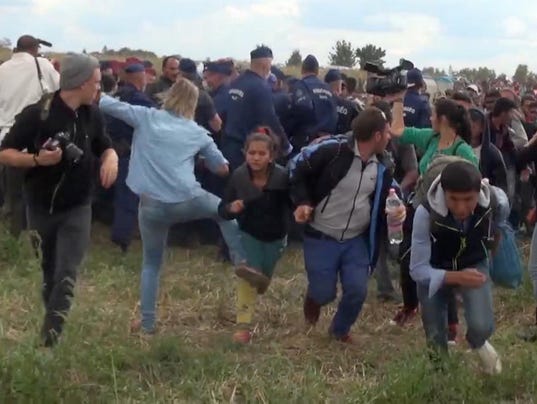The Imperative to Moral Charity
"Do not underestimate the urgency. Do not underestimate our imperative to act. Winter is approaching -- think of the families sleeping in parks and railway stations in Budapest, in tents in Traiskirchen, or on shores in Kos. What will become of them on cold, winter nights?"
"Let us be clear and honest with our often-worried citizens. As long as there is war in Syria and terror in Libya, the refugee crisis will not simply go away."
"We will be needing talent; [immigration should be considered a] well-managed resource [not a problem."
"There is not enough Europe in this union. And there is not enough union in this union. We have to change this. And we have to change this now."
European Commission President Jean-Claude Juncker
 |
| Hungarian TV camerawoman Petra Laszlo kicks a child as migrants break through a police line close to the Serbian border. AFP/Getty Images |
The deep suspicions, resentments and divisions polarizing the unity of the European Union was addressed by the EU's top executive in a plan meant to be accepted by all. The equal distribution of 160,000 refugees throughout EU member-nations. Not that 160,000 being absorbed into Europe will make much of a dent in the hundreds of thousands streaming into Europe, estimated to number 500,000 and steadily increasing.
True, Germany has asserted it is prepared to welcome 800,000 Syrian refugees, and Austria opened its door as well, and so has Sweden. True too, Germans, Austrians and Swedes have not been as openly welcoming as their countries' heads. They have lived in real-time the kind of dismay a nation feels as it witnesses all that is familiar and dear slowly churning away as another culture and heritage has imposed itself on the indigenous one. And as it has, the never-ceasing demands for ever greater concessions expressed as entitlements agitate the social contract.
But what is that, the loss of heritage, of culture, of religious-inspired values and priorities, as opposed to the Christian, Westernized sense of philosophical benevolence when it comes to offering haven to people desperately fleeing oppression, repression and the carnage of vicious atrocities? All the more so when photographs of vulnerable, frightened children are front-and-centre, and the most dreadful of all, tiny corpses resulting from Europe's lack of compassion.
So the violent barbarity of a Syrian regime, and the responding pathology of Islamist carnage imposed upon hapless civilians in a tribal, clannish sectarian conflict is not the fault of the religion of peace whose true message has been garbled by the passion of its followers, but of uninvolved and therefore guilty Europe, attempting to live in harmony among its member-states, just across the pond from a geography gone utterly berserk, wallowing in blood.
Their Arab brethren haven't a care for their welfare, eschewing the opportunity to open their borders in welcome to fleeing Syrians, Libyans, Afghans, and Iraqis. The religion of peace which urges its followers to look kindly on one another and extend charity as a major precept of Islam, has been shunted aside in favour of looking away and hoping that Europe, whose conscience is as large as the continent, will fill the gap and take away the nuisance of foul, piled-up corpses.
Mr. Juncker cites history, morality, economics in urging the European bloc to set aside unseemly divisions and act in concert to show their true hearts to rescue the people whom the Turks who have sheltered millions of Syrians temporarily, refer to as 'flotsam'. Waxing poetic, Mr. Juncker speaks of a Europe prepared to welcome refugees from war-torn, poverty-stricken Middle East and African nations; the will must be there and the need must be met.
This is sacrifice of the highest order, altruism beyond imagination. In rescuing the persecuted, oppressed and endangered populations of Islamic-majority countries from their tyrants, rulers, rogue militias and terrorist groups all of whom insist they worship the same monotheistic power and in so doing perform obeisance to that power's wishes, Europeans, from the purity of their compassionate hearts, are prepared to forego their own identities in perpetuity.
But the issue is being placed in the context of the EU's willingness and its fundamental capability to act as a unified whole, reflecting its values. It therefore becomes honour-imperative that member-states act in unison. And as statements from the EU's elite prod and urge and insist, the flood of tens of thousands keeps spilling toward Greece across the Balkans and into Hungary. Hungary has responded with a 175-kilometre fence between it and Serbia.
Aha! then, no less an 'apartheid' state than Israel, with its wall built to keep out suicide bombers. But Austria, Germany, Sweden et al await the prosperous nations of Europe, willing, able and eager to do their part in rescuing the asylum-seekers whose desperation will not permit them to accept non-halal food and scorn inadequate receptions given them by unprepared hosts, disconcerted at the sheer numbers descending upon them.
The Czech Republic and Hungary are joined by the reluctance of Great Britain considering whether Britain may yet exit the EU. Hungary's ugly, truly unfortunate response has been highlighted by camerawoman Petra Laszlo kicking and tripping migrants fleeing from police. The migrants who are, after all, as they themselves point out, human beings, just like those who live comfortable lives while they are forced to flee the threats of war.
Easy answers evade, for life is a complicated affair, as complex as is human nature. And it is the various manifestations of human nature that is so truly deplorable.
Labels: Africa, Arab League, Conflict, Europe, Gulf States, Islamism, Middle East, Migrants, Refugees, Syria

<< Home